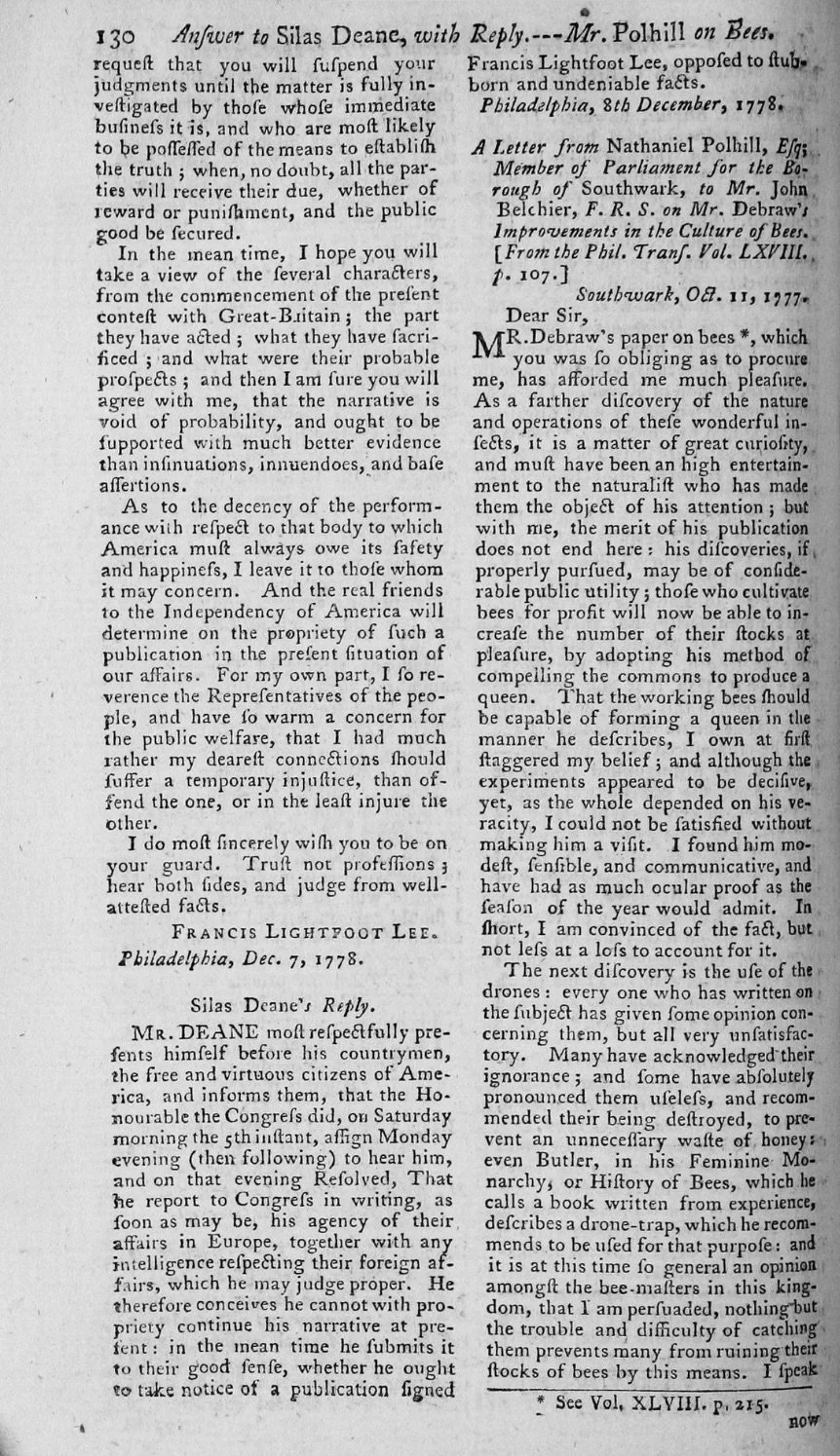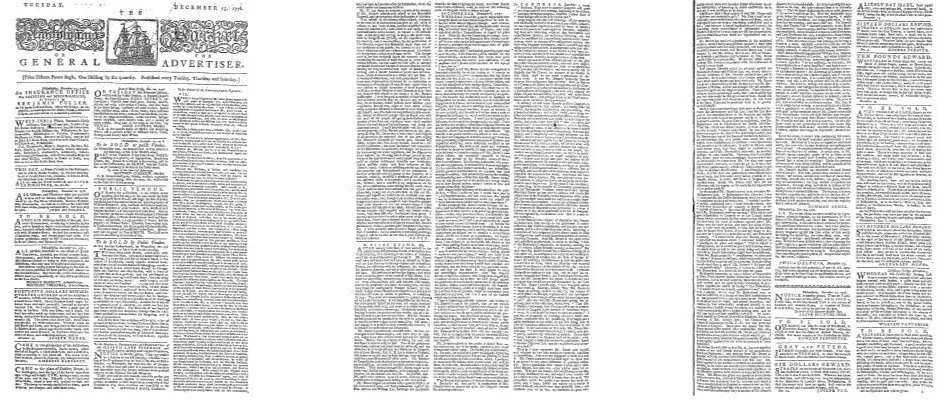Outsider at the Forefront: Francis Lightfoot Lee’s Involvement in the Silas Deane Controversy
By Olivia Mastrangelo, Summer 2025 Interpretative Planning Intern
In one of his last acts as a member of Congress, Francis Lightfoot Lee, best known as a signer of the Declaration of Independence, came to the defense of an injustice against his brothers by Silas Deane. With little published research on Francis Lightfoot Lee and his role as statesman and Virginia delegate to the Continental Congress, this incident sheds light on how he saw politics and his own role in the tumultuous time between 1776 - 1779.
Silas Deane had been appointed in early 1776, along with Benjamin Franklin and Arthur Lee, to serve on the American diplomatic delegation to France. He was recalled to Philadelphia in 1778 to give an accounting of his expenses, having been accused by Arthur Lee of financial impropriety. Deane publicly defamed Arthur Lee and his brother William Lee, fellow diplomats in Europe on behalf of Congress, in response to this recall upon suspicion of embezzlement. Accusations of profiteering were just a few of the disruptive and deceitful actions of Deane that Arthur Lee brought to Congressional attention.
Rather than conduct a quiet trial and permit the continuation of the sensitive diplomatic mission in France that Arthur Lee and William Lee had been a part of, Deane turned the scandal public. He published frequently in defense of himself and slandered many of his fellow public officials.
This imbroglio, as some historians refer to it, consumed Congressional activity in late 1778, when attention should have been focused on the ongoing Revolution. The scandal threatened to end diplomatic relations with France at a time when they were most important to the American cause.
As the scandal claimed national attention in the colonies, Arthur and William Lee, still abroad, were unable to defend themselves against Deane's slander. Their brothers, Richard Henry Lee and Francis Lightfoot Lee, came to the defense of their public image and diplomatic appointments. While Richard Henry Lee led the Congressional movement to recall Deane, Francis worked to quell the emerging public distaste for his family.
Congressional politics at this time largely reflected sectional interest rather than one cohesive national identity. Regardless, the Lee-Deane dispute was as much a matter of factional interest as it was a reflection of said factions' interpretations of the essence of the Revolution. One would assume that
the Lees would’ve gained their support from the South and that Deane, a Connecticut man, from fellow New England businessmen, but the exact opposite was true. The Lees had the support of the Adamses and the Eastern faction, who reflected the ideals of the “Old Radicals”. Deane on the other hand gained the support of the Southern faction, largely for his business interests. This faction saw the Revolution first and foremost as a method of enterprise, rather than an expression of morality.
Throughout this conflict, as well as most of his political career, Francis remained collected and levelheaded. Being a private man he calculated his words before exclaiming them publicly, and gave rational advice to those who were bound to hear him. His prose was persuasive yet unexaggerated, unlike many of the speeches of his contemporaries. Francis Lightfoot Lee urged readers of the Pennsylvania Packet to remain rational before coming to a conclusion on the events unfolding in Congress. He wrote, “I too, most sincerely wish you to be on your guard. Trust not prosessions; hear both sides, and judge from well attested facts.”
The following day, Deanes’ response to Francis Lightfoot Lee’s publication appeared in the same paper. He briefly continues to make his own case and informs readers that Congress has arranged a date to hear him. Gaining the results he wanted from his streak of defamation, Deane claims he can no longer continue to express his narrative publicly. Instead he asks readers if he should acknowledge the publication of Francis Lightfoot Lee which was“opposed to stubborn and undeniable facts.” This interaction would later be published for British audiences in a newspaper known as The Gentleman's Magazine.
Deane was highly active and most critical in his smear campaign, paying thorough attention to public opinion. The countless publications about Deane, on both sides of the ocean, display the way the affair threatened to embroil political relations across the Atlantic world. It concerned the public and the figures who represented them, and dominated popular culture in a time when the outcome of the Revolution was still up in the air.
In a subsequent publication regarding Silas Deane's unseemly behavior, Thomas Paine, writing again under the pseudonym “Common Sense”, demonstrated his grasp on the character of the American people, in an attempt to dissuade each archetype from the untruths of Deane. “Mr. Deane’s Address was calculated to catch several sorts of people; the rash, because they are fond of fiery things; the curious, because they are fond of curiosities; the weak, because they easily believe; the good, because they are unsuspicious; the tory, because it comforts his discontent; the high whig, because he is jealous of his rights; and the man of national refinement, because it obscurely hints at national dishonor. The clamor, it is true, has been a popular one, and so far as it is the sign of a living principle, it is pleasant to see it; but when once understood it will amount to nothing, aud with the rapidity that it rose will descend.”
This extensive publication displays the idea that Deane’s disrespect affected all involved in American Politics. It was not a minor conflict between the Lees and Deane, but a challenge to the future of the nation, threatening to impact the livelihood of all Americans. This affair shows that the misdoings of one man could threaten to tip the balance of a Revolution. Depending on the outcome, either the weakness or the strength of the American effort would be confirmed.
In a letter to Richard Henry Lee, Francis called Silas Deane's official report to Congress of his affairs in France “the most pompous bloated thing that ever was on paper.” He believed that this affair was an attempt by the Party of Deane supporters to replace current diplomats with their own men, under the guise of moderation.
In the same letter, Francis recounts the selfish nature of Deane’s address before Congress. “Altho Deane had two Colleages, the word We, is never used in his Narrative, I did everything. I procured all the supplies, bro’t about the Alliance, procured D’Estaings fleet, conducted them to America, discover’d the designs of the Enemy & baffled them, in short, I have establish’d the Liberty & independance of America; whose safety & happiness now depends upon my vigilance.”
From this excerpt it is clear that Francis views Silas Deane as a disloyal figure, abandoning his comrades in favor of embellishing his own actions and emphasizing his own innocence by any means necessary. It is also clear that the affair affected more than relations between the Lees and Deane. It would come to affect the balance of power in the American process, and therefore the goals of the Revolution. The replacement of the present diplomatic figures in France would spell the end of the “Old Radicals” vision for the war effort, in turn focusing on the expansionary interests of the Southern faction.
While Silas Deane attempted to win over the public by scandalizing his fellow American diplomats, Francis Lightfoot Lee appealed to the rationality of the American people. Francis’s belief in the ideology behind the revolution led him to staunchly defend his brothers in the eyes of Congress and the public.
This imbroglio dragged on for months on end, taking a great toll on the Lee faction. The President of Congress, Henry Laurens, resigned because of Congress’s inadequate response to the controversy. Arthur Lee was recalled, and William Lee was removed from his post, leaving Ben Franklin to represent the colonies to the French. Ultimately, after much deliberation, a compromise between factions was made. John Adams was put in the post of peace commissioner, and John Jay as plenipotentiary to Madrid. Adams, Jay and Franklin worked toward negotiating the Treaty of Paris. History remembers these figures for their successes, and largely forgets the effort of their predecessors.
After the resolution of the conflict, both Francis and Richard Henry Lee resigned from Congress and returned to their homes in Virginia. After a short period of service in the Virginia state senate, Francis left public view for the remainder of his life.
-
Primary Sources:
-"Advertisement. " Pennsylvania Packet (Philadelphia, Pennsylvania), December 8, 1778: [3]. Readex: America's Historical Newspapers.
-"Legislative Acts/Legal Proceedings.“ Pennsylvania Packet (Philadelphia, Pennsylvania), December 5, 1778: [3]. Readex: America's Historical Newspapers.
-Pennsylvania Packet (Philadelphia, Pennsylvania), December 15, 1778:[3]. Readex: America's Historical Newspapers. https://infoweb-newsbank-com.us1.proxy.openathens.net/apps/readex/doc?p=EANX&docref=image/v2%3A10CEB9BDCC081400%40EANX-10E0D77E658E5970%402370810-10E0D77EAE06B700%402.
-Francis Lightfoot Lee to Richard Henry Lee, Phila. Decr. 25th. 1778, Jessie Ball duPont Memorial Library, Lee Family Digital Archive, Lee Letters.
Secondary:
-Abernethy, Thomas Perkins.
“THE ORIGIN OF THE FRANKLIN-LEE IMBROGLIO. ” The North Carolina Historical Review 15, no. 1 (1938): 41–52. http://www.jstor.org/stable/23516471.
-Goldstein, Kalman.
“Silas Deane: Preparation for Rascality.” The Historian 43, no. 1 (1980): 75–97. http://www.jstor.org/stable/24445906.
-Henderson, H. James, “Congressional Factionalism and the Attempt to Recall Benjamin Franklin”, The William and Mary Quarterly, Vol. 27, No. 2 (Apr., 1970), pp. 246-267 https://www.jstor.org/stable/1918652
-McGaughy, J.. Richard Henry Lee (1732–1794). (2020, December 07). In
Encyclopedia Virginia.https://encyclopediavirginia.org/entries/lee-richard-henry-1732-1794
-Smith, Paul H, and Ronald M Gephart. Letters of delegates to Congress, -1789. Washington: Library of Congress: For sale by the Supt. of Docs., U.S. G.P.O., to 2000, 1976. Pdf. https://www.loc.gov/item/76002592/.
Thumbnail Image:
Silas Dean. n.d. Engraving on paper. The Trout Gallery, Dickinson College; Gift of Charles Coleman Sellers. https://jstor.org/stable/community.15688004.
-
Olivia Mastrangelo is a rising junior and history major in the Joint Degree Program at William & Mary and the University of St. Andrews.
Learn more here.



